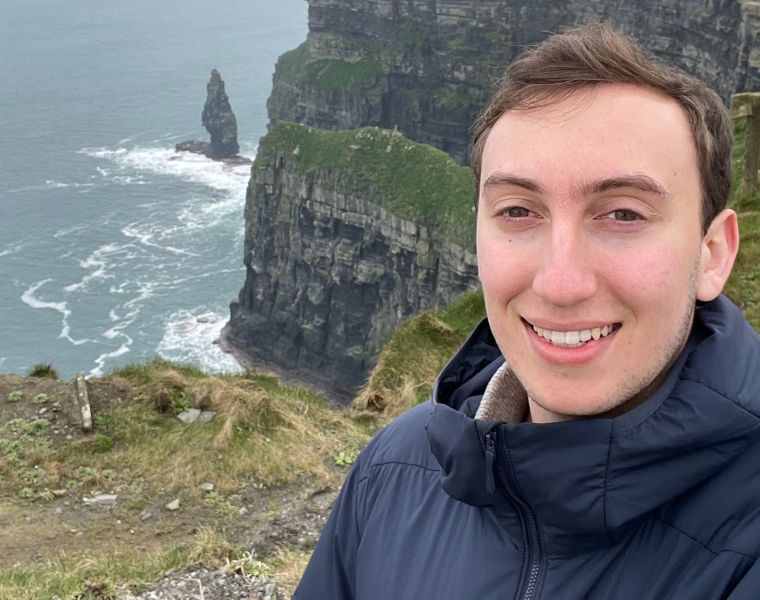In his program at Case Western Reserve University, graduate student Ellis Wright ponders such questions as: “What is intelligence?” and “What does it mean to know something?”
With a focus on artificial intelligence, Wright is a rising third-year student in the Master of Science in Computer Science program. Wright initially came to CWRU as an undergraduate to study mathematics, drawn to the university by offerings like Sears think[box].
As a CWRU student, Wright had the opportunity to take part in the Great Lakes Energy Institute ThinkEnergy Fellowship (2021-2022) and the Fowler Center for Business as an Agent of World Benefit ThinkImpact Fellowship (2023-2024). On campus, he also spent two years on Case Ultimate, the university’s competitive frisbee club.
Read on to learn more about Wright’s experience at CWRU.
Answers have been edited for clarity and length.
1. What led you to pursue these areas of study ?
I was always interested in mathematics because it was the language of science. I then had two influential professors, [the late] Elizabeth Meckes [(CWR ’01; GRS ’02, mathematics)] and Kyle Taljan [(GRS ’15, biomedical engineering; GRS ’22, mathematics)], who inspired me to pursue my major. They taught the material in such a way to shape my thinking and how learning math was more about framing problems than solving problems. When I took my first ever programming class with [Harold Connamacher], I instantly saw its potential for solving complex problems that were previously impossible.
These subjects go hand-in-hand, and each has [helped] me understand more about the other. CWRU’s interdisciplinary curriculum allowed me to take a variety of these classes even though they are technically in different schools.
2. What do you enjoy most about your areas of study?
AI is revolutionizing every field. I think it is fascinating that we can represent physical space in a digital space, make manipulations in the digital space, and then transform those results back to see predictable changes in the physical space.
3. Can you describe your experiences as a ThinkImpact and ThinkEnergy fellow?
As part of the ThinkEnergy Fellowship, we got to travel to the [Advanced Research Project Agency – Energy] Conference in Denver, and as an alumnus, I was lucky to be invited to the conference in Washington, D.C., the next year as well.
For the ThinkImpact Fellowship, we traveled to Dublin and Galway to learn about government missions and to speak with local business people and community development organizations. We had biweekly calls with students at Zayed University in Dubai, during which we practiced different stages of starting a business.
At the end of these fellowships, I learned a lot of practical knowledge and became close with other like-minded fellows. I would recommend [the ThinkEnergy fellowship] to anyone with an engineering background who wants a realistic understanding of the energy landscape and the challenges facing the green transition.
4. How else are you involved on campus?
I am a member of the Steiner House, a graduate student housing co-op on Bellflower Road. I worked at Tinkham Veale University Center for five years starting as a set-up crew member and eventually becoming a graduate student manager, which kept me informed on upcoming events and the variety of groups on campus.
With my entrepreneurial spirit, my friend and I started an events services company AREA, and you might see some of our new technology in the building soon.
5. What are your post-graduate plans and aspirations?
I really enjoy building tools for domain experts, and I want to keep doing that. I’ve worked with biophysicists, hydrologists, material scientists, manufacturers, and civil servants. I can manipulate and visualize data, and they can craft stories to explain it. I get to learn about so many different subjects while providing experts with modern tools to be more effective at their job. It’s a win-win that I want to keep doing.


